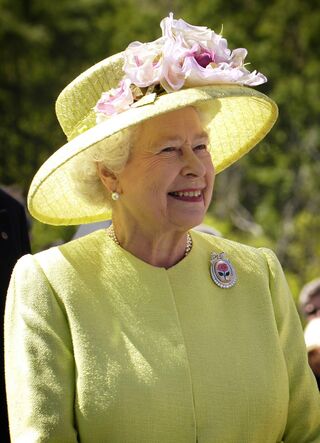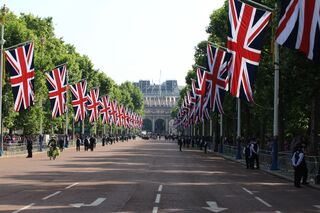Grief
Mourning a Monarch: Why People Cry For Virtual Strangers
Knowing why makes sense of a collective experience that feels oddly personal.
Posted September 25, 2022 Reviewed by Tyler Woods
Key points
- When Queen Elizabeth II passed, many felt a sense of loss, just like at the end of a relationship.
- Many struggled to understand this emotional attachment with a virtual stranger.
- Eight reasons make sense of this seemingly irrational behaviour.
- In a world where people crave certainty, its roots lie in disrupted stability.

All over the world, people felt a surge of emotion following the passing of Queen Elizabeth II. Commonwealth nations mourned, yet few knew her. Some grappled to understand this phenomenon. Notwithstanding respect for the sense of duty, achievement, and commitment, why did millions lament someone they didn't know?
Citizens spent millions of pounds on flowers despite a cost-of-living crisis. The elderly queued to view the Westminster lying-in-state. Legendary footballers queued alone. And world leaders canceled plans to pay respects.
When people empathize with victims of a car accident, tragedy, or abuse, it's understandable—it's often a shock and simply our human response. But there was no tragedy per se with the predictable passing of a 96-year-old. The inevitable was planned decades in advance.
Understanding why this happens helps make sense of the individual and collective response to a major event. The reasons are interlinked and centre around disrupted stability in a world where people crave certainty.
8 Reasons We Mourn Strangers
It's tempting to find one singular explanation for human behavior. If only that were true. Explanations for the phenomenon of crowds that mourn strangers encompass several psychological factors.
As a behavioral scientist, I offer eight reasons why people cry for strangers—literally and figuratively. Let's start with familiarity.
1. Familiarity
In today's social media era, the lives of famous people are blasted open. We feel we know celebrities, royals, athletes, or musicians. When we have prior exposure to strangers, subconscious memories are triggered thanks to the repetition effect and availability bias; hence we value the stability of familiarity.
Like a daily newsreader or favorite actor, royal figures reside in our background as part of our lives and homes, yet they are utter strangers. Nevertheless, they exude a certain mystique.
2. Mystique
Although it may feel contradictory with familiarity, a monarch offers subjects a glimpse into a royal fairy tale. This evokes a sense of mystique and heightens curiosity. Queen Elizabeth II performed an extraordinary role well beyond ribbon-cutting and charity appearances. The symbolism of the ornate palaces, stately gardens, and 317-carat Cullinan diamond crown contrast sharply with ordinary lives. These glimpses offer elements of escapism and glamour to routine lives.
When Operation London Bridge and Operation Unicorn were mobilized, broadcasters rolled out reams of historical footage, reinforcing the magic with a historical edge. The footage only deepened the sense of loss.
3. Loss
At funerals, sometimes non-relatives seem oddly grief-stricken. Why? Intense memories of prior loss are typically triggered. Queen Elizabeth II likely reminded many of their kindly mother or grandmother. U.S. President Joe Biden remarked how the Queen reminded him of his own mother.
But when someone or something that was always part of your existence passes, it represents the loss of stability in what is already an unstable world.
Stephen Coleman, Professor of Political Communication at the University of Leeds, suggests the search for "reliable constants" is understandable. A monarch's passing represents a loss of the fairy tale. It marks a sense of disappointing finality and disruption.
It's like when your favorite Netflix series ends, the connection with the characters is suddenly severed. You feel bereft. It's a form of separation anxiety. You may recall the mass outrage at the Game of Thrones final episode. It wasn't what viewers wanted. What was the next chapter?

4. Identity
For proud Britons, the monarch is part of their identity. Nationalism contributes to our sense of who we are. The pomp and pageantry displayed Great Britain to the world, from the choreographed trooping, formidable pallbearers, and naval officers pulling the gun carriage.
The magnitude of outpouring for a 96-year-old illustrated resurgence of national pride. An estimated one million people turned out, which matched the funerals of Princess Diana, the Queen Mother, and Mother Teresa.
Writer Benjamin Radford explains, "in our often-isolating society, joining others to mourn for a stranger helps people feel connected, part of a larger whole and a common cause."
Crowds transform our identities. Consider how you feel watching a sports match on your sofa compared to being in a packed stadium. The 14-hour lying-in-state queues reflected a patriotic commitment to identity—the longer the pilgrimage, the more national commitment was reinforced.
5. Beliefs
Regardless of social position, people align with those who share similar values. Monarchists and non-monarchists lamented the Queen's beliefs and values, such as dignity, duty, and commitment to service.
Today, with the not-so-great resignation, such longevity is not something the average employee considers. So, when dedication to service is exhibited so faithfully over 70 years, many applaud this – and bemoan its loss.
When U.S. Supreme Court Justice Ruth Bader Ginsburg died, many recognized a similar loss of a symbol of strength for equality and justice. Her staunch beliefs had changed history.

6. History
Physical attendance is part of the grand ritual. People want to be part of a significant historical event, regardless of whether it's a state funeral, corporate transaction, or sports championship. For some, attendance and participation provide bragging rights. What did you do? Groups flew from South Africa and the USA. Couples extended holidays. Even children were taken out of school. Future King, Prince George was allowed to attend the funeral, a first for a seven-year-old.
Professor Stephen Reicher summed this up nicely: "The growing significance of the crowd increasingly became a reason for joining the crowd, creating a snowball effect. Being in the crowd wasn't just about witnessing history; it was about being history!"
The crowd wants to celebrate a historical era as much as its end. Consider Roger Federer's farewell retirement match. Arch competitor Rafa Nadal felt the end of an era. Both cried openly. Rafa declared, "A lot of years, sharing a lot of things together… When Roger leaves the tour, an important part of my life is leaving too."
7. FOMO
The next reason is "fear of missing out," or FOMO. When unsure, we look to others for social cues. When a stranger dies, momentary sadness is normal. However, blanket media coverage of Queen Elizabeth II leaves you wondering if you should be feeling more.
Footage of lengthening queues created a local contagion, prompting 250,000 citizens not to miss out. It's too crude to say people were herding, as strong sentiments were evident.
Nobody wants to miss out. But even those present missed something. For example, if you attend the lying-in-state, maybe you miss the Princes' Vigil. Or you queue but miss David Beckham's donut distribution. Missing out and being left out is emotionally destabilizing at any time.
8. Collectivism
When I watched the state funeral, hundreds of different nationalities congregated around a screen, silently saddened for a stranger. When emotion binds people to a media-dominated event, Newsweek writer Ken Auchincloss calls it "event grief." If people experience grief collectively, it provides a sense of shared unity and understanding.
These moments represent an opportunity for leaders and even organizations to unify culture and reinforce stability. Few take it.
All things considered...
Not only monarchists empathize with a seven-decade Queen's passing and the end of a generation. When it feels oddly personal, it's worth asking why.
Of course, nostalgia is transient. A week after "the most significant moment in British history," TV broadcasters have quickly switched to Ukraine, Trump, and scandals.
Mourning is but a reminder of our humanity, even if it is about strangers. Next time you feel what seems like an odd emotional connection with a stranger, at least you will understand the psychological reasons why.




